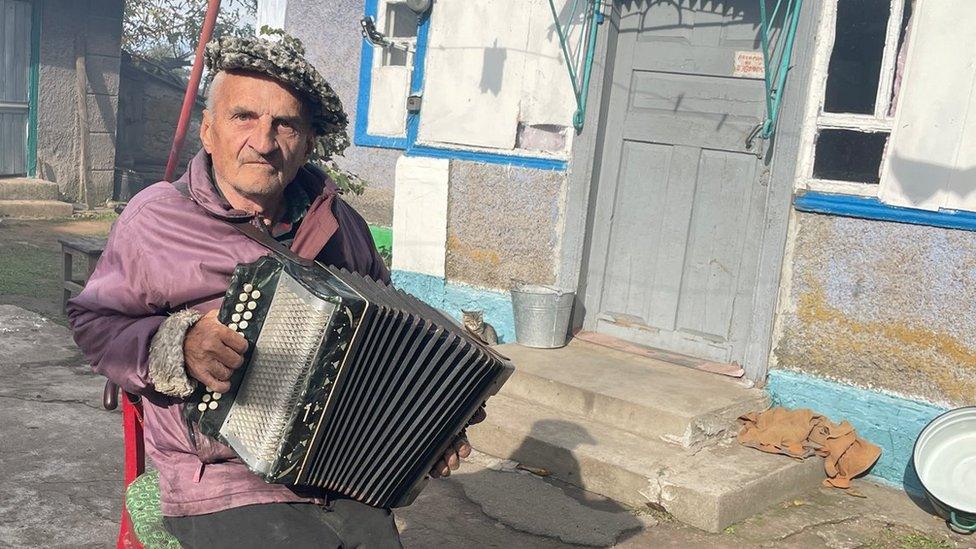Russia-Ukraine war: At the front line of Ukraine's struggle for Kherson
- Published
- comments
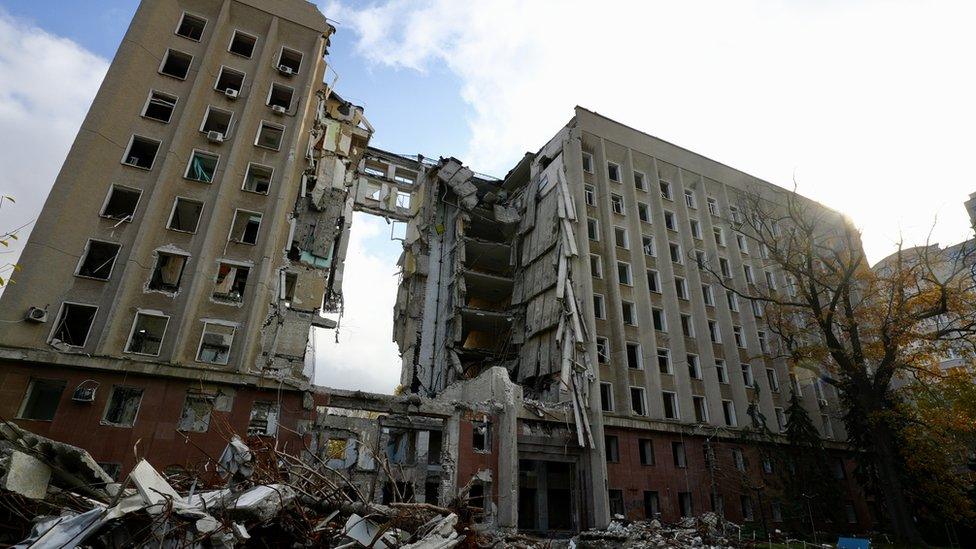
The BBC spent several days on the front line between Mykolaiv and Kherson
The city of Kherson on the Black Sea coast was the biggest prize seized by Russia in the first month after its invasion on 24 February. Now there are suggestions that Russia might be about to give up at least part of it as it prepares defensive lines for the winter.
Kherson, its suburbs and outlying villages are spread over both banks of the mighty Dnipro, one of Europe's great rivers. In the last few days Western officials have briefed journalists to expect a partial Russian withdrawal from the western side of Kherson.
The officials said Russian commanders could be preparing to pull back to the more defensible eastern side of the river, also known here as the left bank, taking advantage of its qualities as a formidable natural obstacle.
Since the summer Ukraine has run a media offensive about its plans to recapture Kherson. It telegraphed the announcement of its military plans so clearly that some analysts decided it was a feint to cover a rapid and successful offensive that recaptured a considerable amount of territory in north-east Ukraine.
Watch: Ros Atkins asks Jeremy Bowen about reporting from Ukraine's frontline
On the ground here in the southwest of this big country, Ukraine's military offensive has been much more cautious. The Ukrainians are very serious about recapturing Kherson.
President Volodymyr Zelensky needs a victory - not just for the morale of his citizens, but to reassure his allies that this is a war Ukraine can win. But the ambitions of the political and military leadership have collided with the stark realities of pushing the Russians back.
After spending several days this week on the Ukrainian lines around the Kherson perimeter, interviewing front-line soldiers as well as senior officers, it is clear that the men who have to fight in southwest Ukraine have learnt the hard way that the Russians remain a formidable enemy.
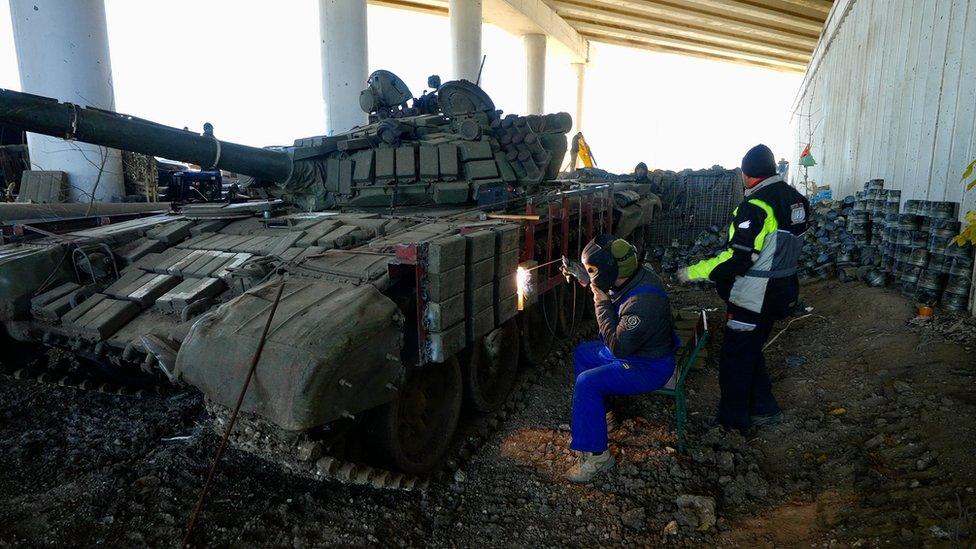
The Ukrainians are under no illusion about the difficulty of recapturing Kherson city
On the front line between Mykolaiv and Kherson a Ukrainian soldier, a local man who said his name was Ilya, puffed on a fat cigar as Russian shells targeted his unit's position. He had bushy hair and a dark beard and revelled in a certain resemblance to Cuban revolutionary Che Guevara.
"It's very hard to make progress here. It is necessary to concentrate a large amount of force in one point to break through the front line. Our job is to hold our position. We attack from time to time so that they don't take their reserves and transfer them somewhere else."
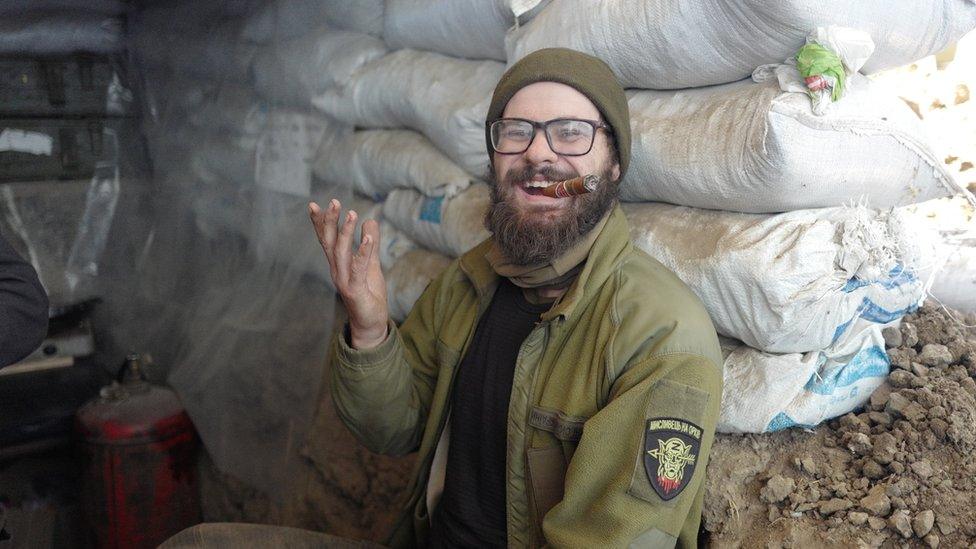
For those fighting on the front line like Ilya, Russia remains a formidable enemy
"It is very difficult and slow-going. They control the sky. They've got much more military equipment, more people and more ammunition.
"Their people are not trained, but they just go straight forward shouting 'hurrah'. We don't have as many cartridges as they have people."
Casualties are another factor. Both Russia and Ukraine have suffered tens of thousands of dead and wounded. Precise figures are not available. Neither side wants to admit the damage caused by the other.
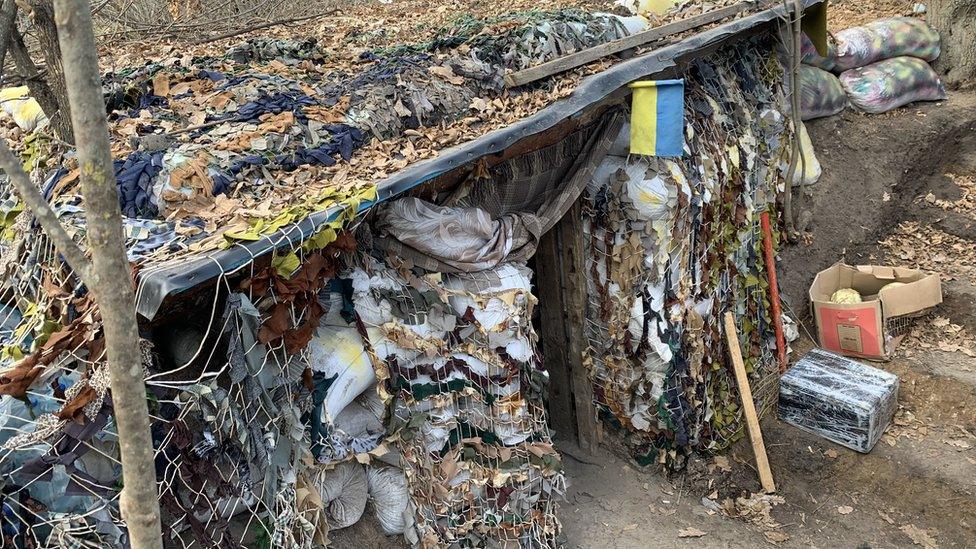
Soldiers of the 63rd Brigade under Major "Fougasse" prepare for winter in their trenches
But on the Ukrainian side the army contains thousands of citizen volunteers. Commanders need to protect the men they have in uniform. They do not want to lose any more experience, and are conscious that heavy casualties are bad for national morale.
Ukraine is a big country, but it has a population of less than 40 million. The male population is already highly mobilised.
On the front line a major who called himself "Fougasse" toured his men's trenches and dugouts. When asked about the talk of an offensive, he was cautious.
"Moving forward and a counter-offensive is complicated to plan for, and it's a threat to people's lives. We have to take account of everything. That's our job as commanders, to keep our men alive."
Ukraine has made progress. Since early September it has recaptured several hundred square kilometres of the Kherson administrative region. On the edge of one village a rusty watermelon sign was pitted with shrapnel holes. In better times the area was famous in Ukraine for producing the fruit.
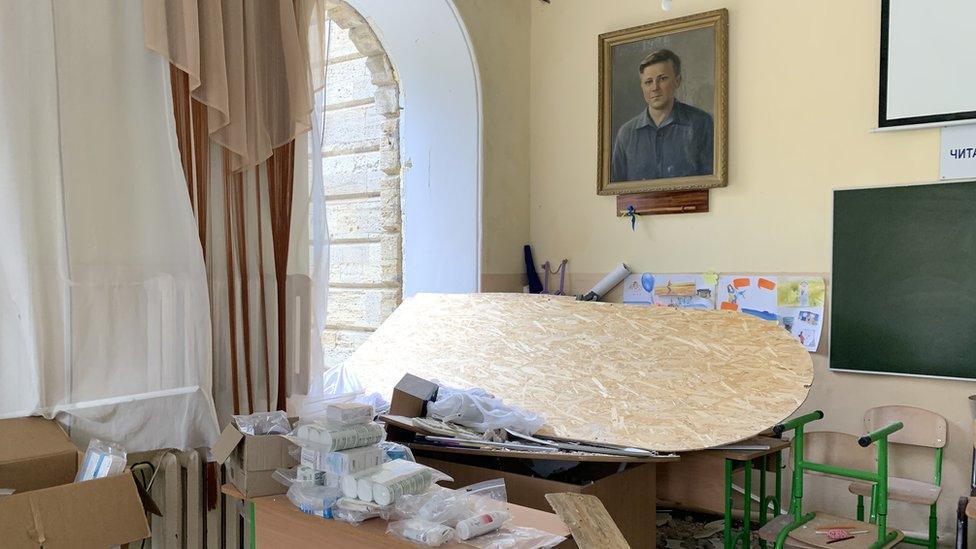
A school targeted by Russian shelling this week in the heavily attacked city of Mykolaiv
The fighting often leaves villages in ruins. Ukraine says the Russians try to flatten houses with shellfire after they are forced out. The few villagers who had come back to survey their property in one tiny community I visited had a different story. They said a lot of damage to their homes was caused during the Ukrainian fight to eject the Russians. Almost no roof was intact.
In the ruins of the office of the regional governor in Mykolaiv which was destroyed in a huge Russian missile strike in March, Maj Gen Dymytro Marchenko called what was happening in the flat farmland of Kherson Oblast the battle of the villages - tactical fights on a local scale. "We're trying to take positions that we need for the counteroffensive. We are not standing still. Every day we recapture a village," he said.
But Gen Marchenko, who became a hero in the southwest in the first months of the war when he led the fight to stop the Russians advancing beyond Kherson towards Mykolaiv and Odesa, said it would be a much harder undertaking to concentrate enough force to break the Russian line and to mount an assault across the Dnipro under the Russian guns.
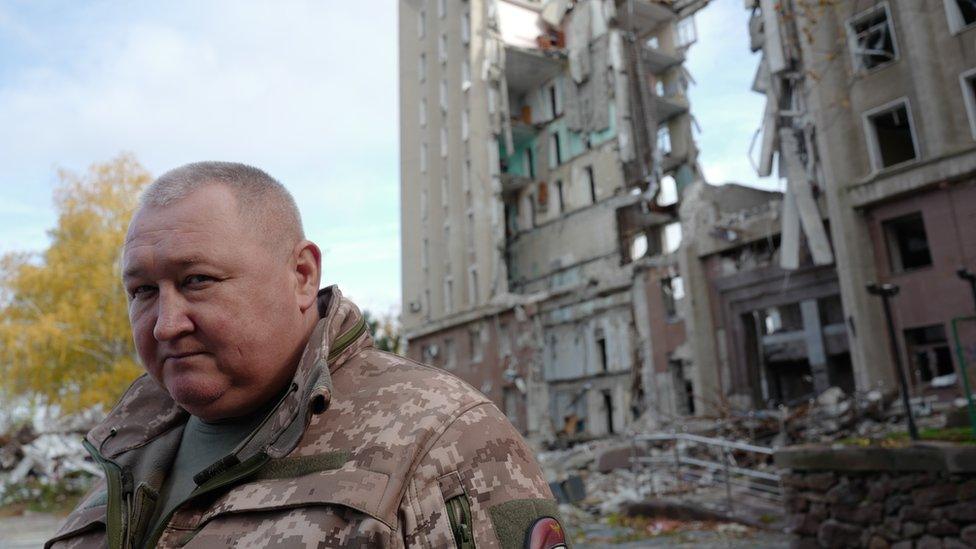
Gen Dymytro Marchenko says his troops are trying to take positions they need to enable a counteroffensive
"For a proper counteroffensive we need to have the required number of personnel, weapons and equipment. As soon as we get all this, a counteroffensive will take place.
"First of all, we need reactive artillery that can hit up to 300km (180 miles) from us. And we need an air defence system - basics for any army in the world that wants to go on the offensive."
For now the big prize, Kherson itself, remains in the hands of Russia. Throughout the autumn, Russia has reinforced its positions there. Gen Kyrylo Budanov, head of Ukraine's directorate of military intelligence, said in a recent interview that Kherson was defended by Russia's best units, from the marines, and airborne and special forces.
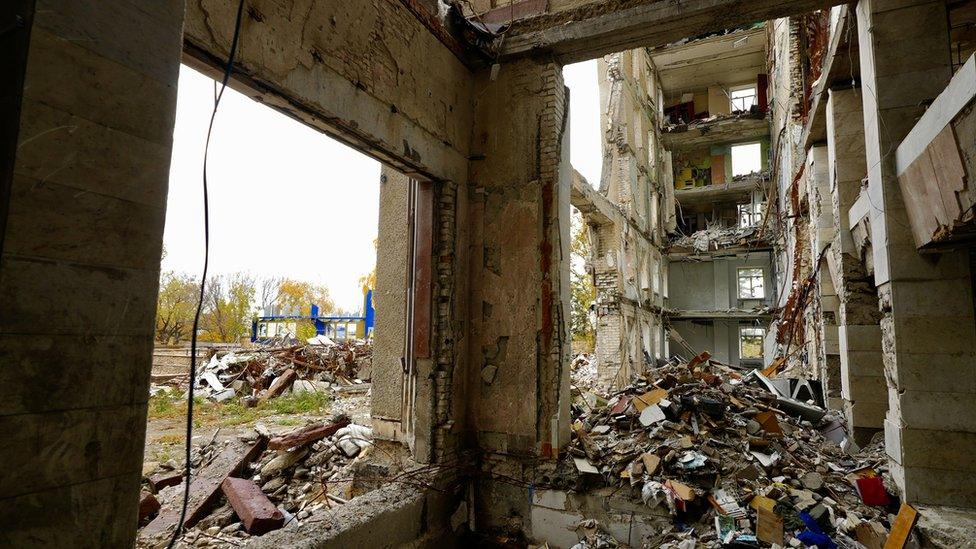
Mykolaiv, once a thriving port city, has been shelled constantly since the war began in February
It is hard to see why Russia would pull out of any part of Kherson unless it was under severe military pressure.
The message from the front lines is that while Ukraine is taking villages in the big pocket Russia captured on the west side of the Dnipro river, it does not have the combat power to break through well-prepared Russian positions into Kherson city.
That might change, as more powerful weapons arrive from the US and Ukraine's other allies in Nato.
Some Ukrainian sources have dismissed reports that the Russians could be pulling back from part of Kherson as a ruse to draw them into a rash attack. It is possible, however, that the Russian command might decide that the line of the Dnipro River is the best natural defence available, especially as its forces on the western bank come under more pressure.


It is not at all certain, based on their military performance so far in this war, that the Russians have the capacity to mount a fighting retreat over the Dnipro. Ukraine's army has proved itself to be flexible and competent in a way that the Russians are not, and would surely push forward if it saw Russia pulling back.
Another factor is the impact of Iranian munitions. Military sources here worry that Iran might supply more powerful drones or missiles than the ones that so far have shown themselves to be effective weapons. That would put Mykolaiv, the city down the coast from Kherson, under more pressure.
Attacking cities means killing the civilians who are in the firing line.
This week Mykolaiv has been hit by the Russians, not often but regularly. One morning an elderly woman called Liubov Levhenivna looked on as men cleared plasterboard and rubble from the remains of her home. A neighbour was killed in the raid.
She had just returned from hospital, after major surgery. Liubov's two sons are in the army. One is in hospital, after being seriously wounded on the Kherson front. The other is fighting in Donbas, in the east.
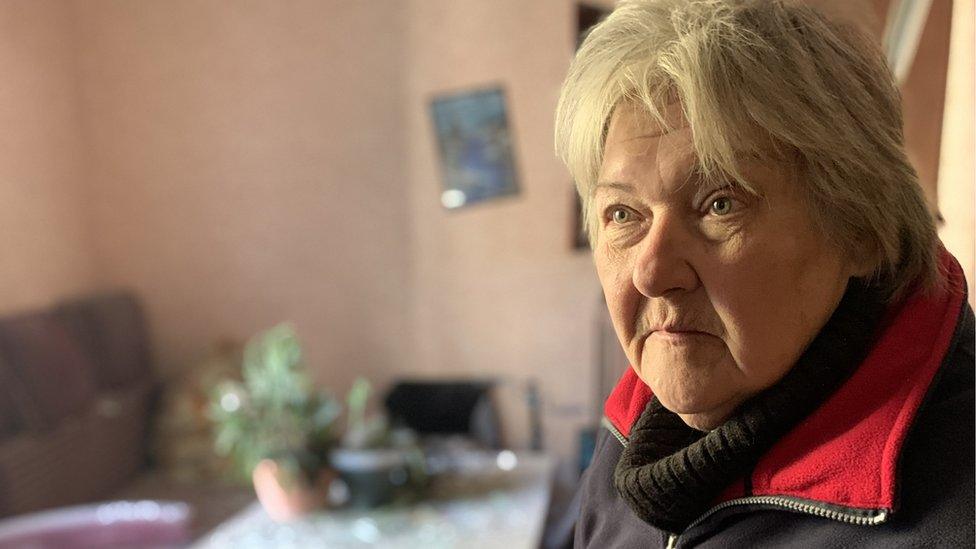
Liubov Levhenivna, whose house was destroyed in an overnight attack in Mykolaiv near the university
"I am alone" she said. "After the operation, I don't know how I can cope with it all alone."
Right across Ukraine, people like Liubov, who have very little, are losing everything.
Russia's tactic of hitting power supplies is hurting the Ukrainians. In Mykolaiv, Russia has damaged the water system. Tap water is yellow and brackish. Civilians who cannot afford bottled water for drinking and cooking have to queue for water that is brought in by tanker.
Long months of a winter war lie ahead.
Related topics
- Published1 November 2022
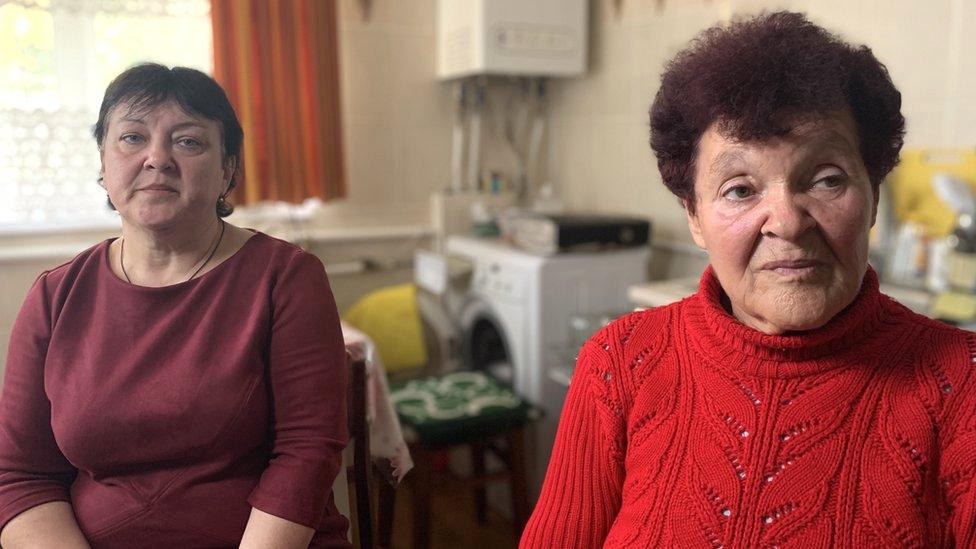
- Published23 October 2022
